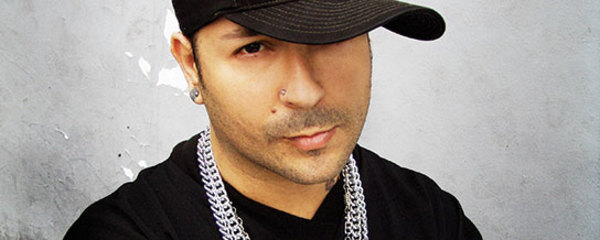Edu K: A Brazilian Punk Hauls Ass
The raunchy, distorted crunch of an electric guitar’s power chords; the chest-convulsing thump of a […]
Edu K: A Brazilian Punk Hauls Ass
The raunchy, distorted crunch of an electric guitar’s power chords; the chest-convulsing thump of a […]

The raunchy, distorted crunch of an electric guitar’s power chords; the chest-convulsing thump of a speaker-wall of beats; a soccer mob chanting the booty-worship refrain “Vai, Popozuda!” (which translates roughly to “Shake that hot ass, girl!”). For the past four years, it’s been hard to escape “Popozuda Rock ‘n’ Roll,” Brazilian producer Edu K’s anthemic mating of metallic guitars with Rio’s bass-heavy baile funk. The song has appeared on Brazilian rock radio, favela funk compilations from Diplo and Essay Recordings, even European car commercials. Now, with a full-length album of rock- and reggaeton-inflected baile boomers, Frenétiko (Man Recordings), Edu K feels ready to take the sound of Brazil’s ghettos to the world.
Edu K’s musical career began far from the late-night funk dances of Rio’s shantytowns, in the relatively sleepy town of Porto Alegre in Brazil’s southeast. It was there, in the ’80s, that Edu K and a few friends aligned with European New Wave and formed Defalla, the post-punk band Edu K fronted until 2000.
“Defalla was for the goth, English rock stuff originally,” he says. “I was just a kid hangin’ around in full makeup, dark clothes, and big, messed-up hair. Aside from us few, the city’s youth was totally into nativismo [traditional Southern Brazilian folklore, music, and clothes], so it was totally ‘style wars’ here.”
Defalla became one of Brazil’s biggest homegrown punk acts, but all the while the ubiquitous beat of baile funk-the Miami bass-influenced party sound prevalent throughout the favela-was rumbling in the background. In the late ’90s, as funk became more acceptable to the Brazilian mainstream, Edu K and Defalla fell for its slamming beats and simple, repetitive refrains. They came to believe baile was punk’s true heir, a philosophy of funk that few share.
“There’s a lot of prejudice when it comes to baile funk,” says Edu K. “People say it’s the music from the poor, and rock kids don’t exactly dig the funk scene. [Defalla] was one of a [few] bands to make the bridge between punk and funk. ‘Who says a rock band can play funk?’ was the general attitude. Well, George Clinton did!”
On Frenétiko, Edu K takes his punk-baile sound a step further, incorporating elements of his early electronic interests (Kraftwerk and Giorgio Moroder, for instance) and current reggaeton sounds on an album to be released only outside Brazil. To Edu K, that’s the ultimate goal: to make music based in Brazil, but with worldwide influences and appeal.
“Reggaeton, dancehall beats-they all groove a lot like traditional Brazilian folklore riddims,” says Edu K of a connection that might lure Brazil’s music out of its self-imposed samba/bossa pigeonhole. “That’s the hook: the African-Jamaican-Brazilian connection! Brazil’s a huge country, and it’s been looking a little bit too much at its own bellybutton in past years, but that’s all starting to change. We’re on our way to being a part of the global village.”

